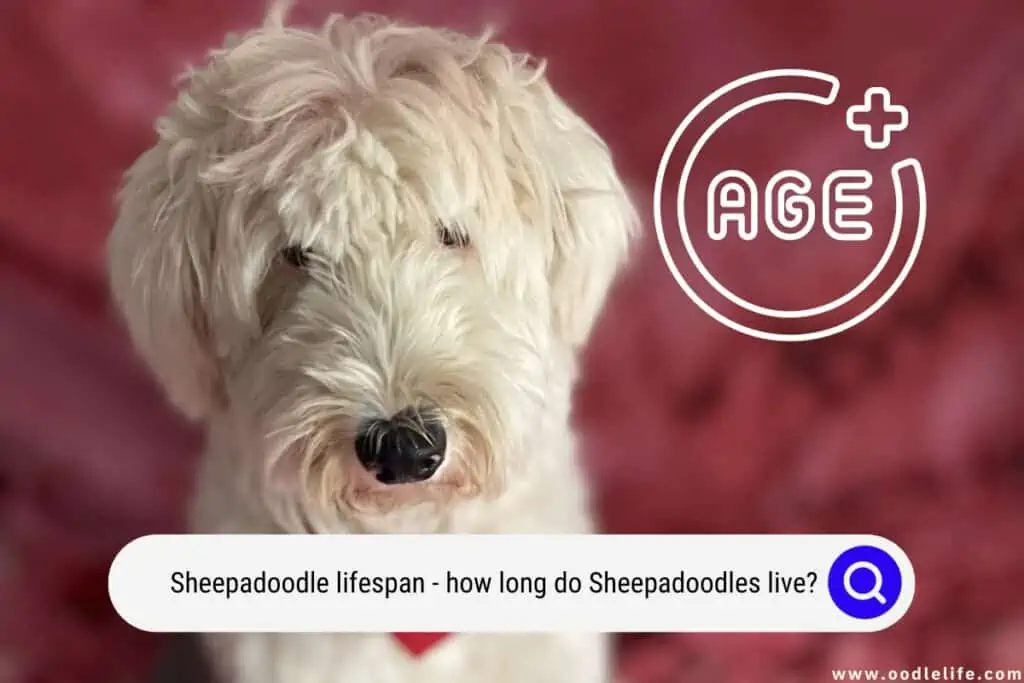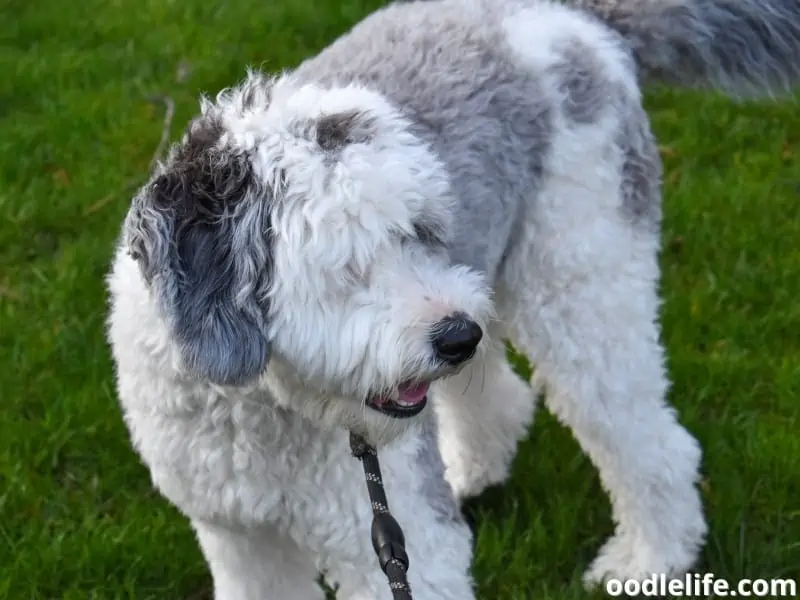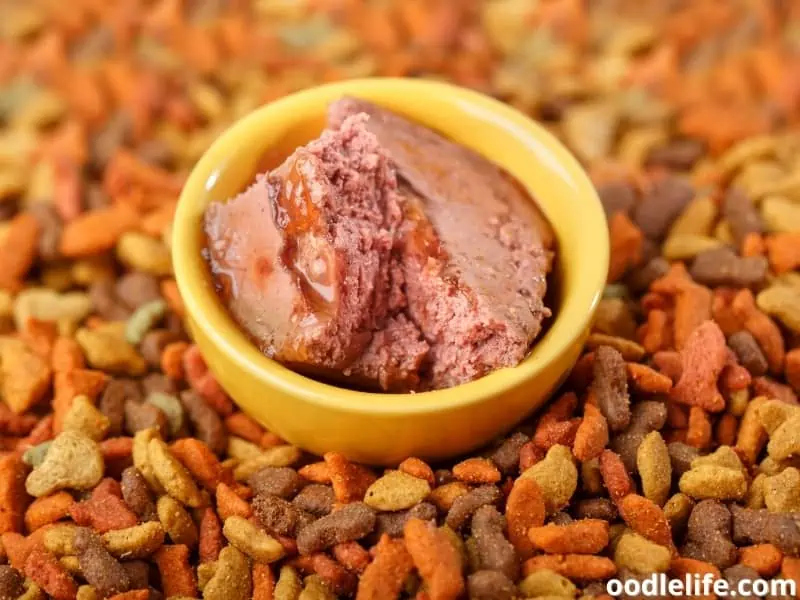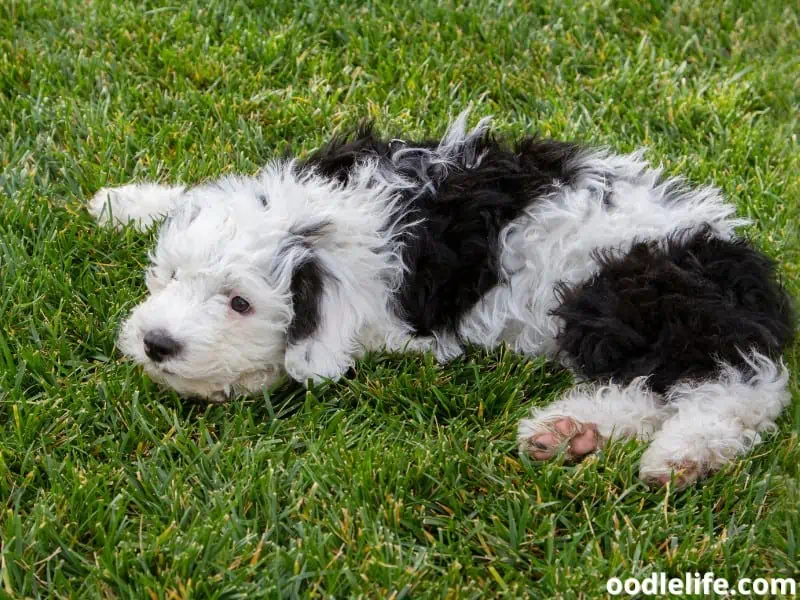Sheepadoodle Lifespan: How Long Do Sheepadoodles Live?
The Sheepadoodle is a cross between the Old English Sheepdog and the Standard Poodle. They are relatively new to the designer dog world, but they are already garnering attention for their amazing temperament and hypoallergenic coat.
Sheepadoodles typically weigh between 50 and 70 pounds and stand anywhere from 20 to 26 inches tall at the shoulder. They are a medium to large breed with a lifespan of 12 to 15 years. When it comes to temperament, Sheepadoodles are incredibly intelligent, loyal, and loving.

They make great family dogs and do well with children of all ages.
With proper socialization, they can also do well with other pets. As for their coat, Sheepadoodles have a dense, curly coat that does not shed. This makes them an excellent choice for people with allergies.
A dog’s life span is affected by several factors, including breed, size, and lifestyle.
Size of Your Sheepadoodle
The size of your Sheepadoodle affects lifespan, with miniature breeds living the longest (13-16 years), followed by medium-sized breeds (12-15 years), and standard-sized Sheepadoodles living the shortest (10-13 years).
While there are many factors that contribute to lifespan, size is one important factor to consider when choosing a breed. For example, standard-sized Sheepadoodles are more prone to health problems and accidents, which can shorten their lifespan. On the other hand, miniature breeds tend to be healthier and live longer.
While larger dogs may not live as long as smaller breeds, they often have longer childhoods and adolescence periods. So, if you are looking for a lifelong companion, consider a miniature breed.
However, if you are looking for a Sheepadoodle that will be a part of your family for many years to come, any size will do.

Do Hybrid Dogs Have a Longer Lifespan Than Purebred Dogs?
When it comes to mixed-breed or hybrid dogs, there’s a lot of debate over whether or not they enjoy better health than their purebred counterparts. Although there’s no definitive answer, there are a few factors worth considering.
- One is the “hybrid vigor” factor, which suggests that hybrid dogs are less likely to inherit the health problems associated with their purebred parents.
- Another is that mixed-breed dogs tend to be less inbred than purebreds, which can also lead to better health.
- Finally, research shows that all mixed breeds live about 1/2 year longer than purebreds, though this difference is not as significant as some might think.
Ultimately, whether or not a hybrid dog has a longer lifespan than a purebred is something that can vary depending on the individual dog.

Exercise Affects Lifespan
Like most people, you probably think exercise is important for humans, but not so much for dogs. After all, dogs are already pretty active, right? Well, it turns out that exercise is just as important for dogs as it is for people.
For example, a recent study found that dogs who exercised regularly lived longer and were less likely to develop health problems than those who didn’t get enough exercise.
So what does this mean for your Sheepadoodle? It means that if you want your dog to live a long and healthy life, you need to make sure they get plenty of exercise. This doesn’t mean you have to take your dog on a 5-mile run every day (although some dogs would love that).
Just a moderate amount of daily exercise will do the trick.
So get out there and enjoy some quality time with your furry friend – it’s good for both of you!

Nutrition Affect Lifespan
Just like humans, the food that your Sheepadoodle consumes has a direct impact on their lifespan. A poor diet can lead to a host of health problems, including obesity, joint pain, and organ disease.
Conversely, a nutritious diet can help your Sheepadoodle to stay healthy and active well into their golden years. When choosing food for your Sheepadoodle, be sure to select an option that is high in protein and fiber and low in fat and carbohydrates. You should also avoid giving them table scraps, as these are often lacking in nutrients.
By making smart choices about nutrition, you can help to ensure that your Sheepadoodle enjoys a long and healthy life.

Health Issues Affect Lifespan
Your Sheepadoodle’s health is a crucial factor in determining how long they will live. While there are many health problems that can affect any dog breed, there are some that are more common in Sheepadoodles.
Cushing’s Disease
Cushing’s disease is a condition that can affect your Sheepadoodle’s lifespan. It occurs when the body produces too much of the hormone cortisol. This can happen for various reasons, including stress, tumors, or certain medications.
Cushing’s disease can lead to several health problems, including high blood pressure, diabetes, and skin problems. In addition, if left untreated, Cushing’s disease can shorten your Sheepadoodle’s lifespan. However, many Sheepadoodles can live long and happy lives with early diagnosis and treatment.
If you think your Sheepadoodle may be showing signs of Cushing’s disease, don’t hesitate to contact your veterinarian. Early diagnosis and treatment are essential for giving your Sheepadoodle the best possible chance at a long and healthy life.

Addison’s Disease
Addison’s disease is a condition that can affect any dog, but it is especially common in Sheepadoodles. The disease occurs when the adrenal glands do not produce enough of the hormone cortisol. This can lead to a number of symptoms, including weakness, lethargy, and weight loss.
Addison’s disease can be difficult to diagnose since the symptoms are often vague and can be caused by other conditions. Treatment typically involves daily injections of cortisol. If the disease is caught early, most dogs will make a full recovery.
However, Addison’s disease can be life-threatening, and it is crucial to seek veterinary care as soon as possible if you suspect your dog may have the condition.
Hip Dysplasia
One of the most common is hip dysplasia, which affects the hip joints. While not all Sheepadoodles will develop hip dysplasia, it is a common enough problem that it’s essential to be aware of the risks. Hip dysplasia can cause pain and lameness; in severe cases, it can lead to arthritis and even cripple a dog.
The good news is that you can take steps to help prevent hip dysplasia, such as feeding your dog a balanced diet and providing plenty of exercise. You should also talk to your veterinarian about screening for hip dysplasia before you get a Sheepadoodle.
By being aware of the risks, you can help ensure that your dog enjoys a long and healthy life.

Gastric Torsion (Bloat)
Gastric Torsion, commonly known as bloat, is a condition that can affect any dog but is especially common in deep-chested breeds like the Sheepadoodle. This condition occurs when the stomach fills with gas and then twists on itself, cutting off the blood supply. If not treated promptly, gastric torsion can be fatal.
Unfortunately, there is no sure way to prevent bloat from occurring. However, there are some steps that you can take to reduce the risk.
- First, make sure that your dog does not eat too quickly or drink large amounts of water immediately after exercise.
- Secondly, avoid feeding your dog one large meal per day. Instead, opt for smaller meals spread throughout the day.
- Finally, ensure your dog has plenty of opportunities to exercise and stay active.
By taking these precautions, you can help to reduce the likelihood of your Sheepadoodle developing gastric torsion.
Common Signs Your Sheepadoodle is Aging
Just like people, dogs go through different stages of life. As puppies, they are full of energy and eager to explore. In their adulthood, they settle into a more relaxed routine. And in their senior years, they may need a little extra care and attention.
So if you have a Sheepadoodle, you may be wondering what signs to look for that indicate your dog is aging.
One common sign of aging in dogs is a decrease in activity level. Just as human seniors often suffer from reduced mobility, older dogs may also start to slow down. They may not be able to walk as far or run as fast as they used to.
You may also notice that your dog takes more naps during the day and seems less interested in playing.
Another common sign of aging is changes in appearance. Just as human hair becomes thinner and grayer with age, a dog’s coat may also start to show signs of age. The fur may become thinner and duller, and you may see more gray hairs mixed in with the normal coat color.
Your dog’s skin may also become drier and less elastic. These changes are a natural part of the aging process and nothing to be concerned about unless they are accompanied by other symptoms such as excessive scratching or hair loss.
If you notice any of these changes in your Sheepadoodle, it’s important to take them into account when considering your dog’s overall health and wellness. However, it’s important to keep in mind that every dog ages differently, and some older dogs remain active and healthy well into their golden years. If you have any concerns about your dog’s health, be sure to talk to your veterinarian.

Final Thoughts
There are a number of factors that can affect the lifespan of a Sheepadoodle.
- First and foremost, diet is important. A healthy, balanced diet will help keep your Sheepadoodle fit and vital for many years to come.
- Second, exercise is crucial. A Sheepadoodle that gets plenty of exercise will be less likely to suffer from obesity or joint problems later in life.
- Finally, genetics play a role in lifespan. Some Sheepadoodles are simply more prone to health problems than others.
However, by taking good care of your Sheepadoodle and providing him with the best possible care, you can help him enjoy a long and healthy life.